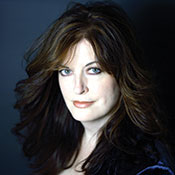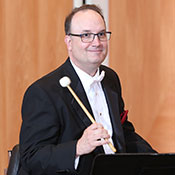
Conductor & Arranger Steve Hackman Combines Worlds
David Lewellen
PUBLISHED
Tagged Under:
It is a truism in the orchestra world that pops concert audiences rarely buy tickets for classical concerts. But conductor and arranger Steve Hackman says that his equal portions of classical and rock are different.
Hackman, who will lead Beethoven X Coldplay with the Milwaukee Symphony on Jan. 20, has made a career out of finding commonalities between mainstream classical composers and notable rock groups. When he did a similar concert with the Pittsburgh Symphony recently, he said that the orchestra’s internal metrics found that his audience was the most likely of any nontraditional presentation to buy tickets to a subscription concert.
He has a standard offer to audiences at his concerts: “Send me a message telling me what you like, and I’ll recommend a concert [on the home orchestra’s schedule] for you to go to. It happens. It shows me there’s an opportunity there.”
For his concerts, “the energy is palpable,” he says. “It draws a different group of people in the community. And there’s an eruption of applause when I give the orchestra their bow. I see them realize, gosh, they’re cheering for us. It’s not a backup band.”
As a child, Hackman “fell in love with everything, classical and pop at the same time, in parallel.” As a student at Curtis, one of the elite institutions of traditional classical music, he was still able to blaze his own trail and find underlying similarities between the worlds. Jazz and rock musicians improvise routinely, and up until the early 19th century, improvisation was also the norm in the classical world. But even for composers as complex as Mahler or Stravinsky, Hackman says, “They wrote their pieces at the piano. They originated as improvisations. The orchestration came later.”
Last year, the MSO presented Hackman’s fusion of Brahms’s Symphony No. 1 and the music of Radiohead. He has also done similar combinations of Tchaikovsky and Drake and of Mahler and rap music, among others. The upcoming MSO concert presents Beethoven’s Symphony No. 3, “Eroica,” in its entirety, but mixed with a number of songs from the British rock band Coldplay. “You don’t have to know classical music or alt-rock,” Hackman says. “They both speak to the big universal human themes.” Beethoven’s “Eroica,” which was originally intended to be dedicated to Napoleon, “is so explosive, emblematic of the heroic Beethoven period,” he said, “and then you combine that with ‘Viva la Vida,’ which evokes the revolutionary, egalitarian spirit.”
Sometimes the vocalists, Casey Breves, Gregory Fletcher, and Malia Civetz, will be singing Coldplay directly on top of the Third Symphony, but for other passages, Hackman has written accompanying orchestral music that fits into Beethoven’s sound world. “All the permutations are used,” he says.
Hackman obtains permission from pop bands’ agents or publishers to use their music, but his concerts have developed enough of a reputation that he hopes the artists themselves may soon be interested in appearing with him and an orchestra.
But finding singers who can work with his unique fusions is not easy. “They’re the communicators, the intermediaries,” he says. “They have an orchestra behind them, and an audience of mostly pop fans in front of them. They have the musicianship and skill level to sing classical music, but a contemporary pop sound. I hold onto them, because they are rare.”
Hackman’s concerts bring worlds together, he said. For an audience that may be entering the Bradley Symphony Center for the first time, “for the first 30 minutes, they’re trying to figure out what to do,” he said. “Do they sit or do they stand? When do they clap? I’m still wondering how to tell the audience to feel at home.”
Some orchestral musicians are thrilled to perform for loud, enthusiastic audiences, but playing a supporting role to a tribute band does not always fully display their talents. “This music is an attempt to address that,” Hackman says. “It’s transforming and elevating pop programming, and it’s meeting audiences where they are.”



